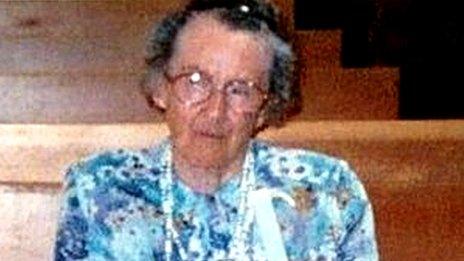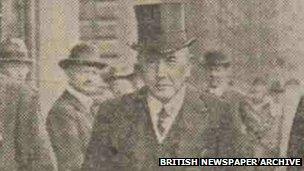Mystery benefactors who leave millions to the nation
- Published

The will of a retired midwife from Bristol was at the centre of a political row this week. But Joan Edwards is not the first person to leave their life savings to the government.
Joan Edwards would probably have been horrified had she known that her will would cause a media storm, nearly a year after her death.
She was, by all accounts, a private person. Yet her £520,000 bequest to the "whichever government is in office at the date of my death" would see her named on a list of big party donors, external alongside major trade unions and wealthy businessmen.
Most people who opt to leave money to the nation in their will manage to remain anonymous.
Miss Edwards was different because her solicitors decided to treat the bequest as a political donation. It was divided up between the two parties in government, the Conservatives and Liberal Democrats, according to the number of MPs and ministers they have.
That meant her name was released by the Electoral Commission on its quarterly list of political donors - sparking a furious debate about whether, in the words of one Tory MP, this public-spirited lady would really have "wanted her money squandered on electioneering".
In the end, David Cameron and Nick Clegg handed the money over to the Treasury, where it will be used to help pay off the national debt.
The case might seem unusual, but Miss Edwards is far from alone in her desire to leave everything to the government of the day.
The Treasury does not keep a central record of the names of these mystery benefactors, but it does keep track of how much has been left behind.
Between 2000 and 2013, nearly £7m was donated - largely in wills, although anecdotally there are stories of the occasional cheque being sent in - towards paying off the national debt.
Each year sees a steady stream of donations to help tackle the UK's £1,377bn debt mountain, some in the thousands, some in the tens of thousands.
Whether a wry sense of humour lies behind the smaller donations for 1p, 41p and £1.99 towards the nation's overdraft can only be guessed at.
But all are handled by the Commissioners for the Reduction of the National Debt - set up in 1786 - whose work investing government funds is carried out by the UK Debt Management Office, based in the City of London.
The Treasury is keen to point out it doesn't go chasing donations at funerals - it has to be alerted by the solicitors acting on behalf of the deceased that money has been bequeathed, before its lawyers get involved.
A list of donations, external towards the national debt since 2004 show Miss Edwards is among the biggest modern-day benefactors.
But back in August 2004, £600,000 (about £800,000 today) was left by one generous unnamed individual.
Another large one-off sum of £428,328 was bequeathed in August 2005 and 2007 saw two massive single donations - with gifts of £309,251 and £550,000 among debt donations.
Donating towards the national overdraft is not a new phenomenon but as most benefactors remain private, we know little about why they choose to do so.
In 1928, another major benefactor found his name in the press.
"Lord Inchcape's gift to the nation", ran the headline in the Dundee Courier and Advertiser on 4 July 1928, as the article went on to describe the "princely gift" of £500,000 made by shipping tycoon the 1st Earl of Inchcape "to go ultimately to the reduction of the National Debt".
Gratefully received
The grieving peer and his wife donated the whopping sum, estimated at being equivalent to £26.5m in today's money, in a trust named after their daughter Elsie, who, months earlier, had vanished while trying to become the first woman to fly across the Atlantic.
"The gift, the residue of Miss Mackay's estate, is the outcome of the desire of Lord and Lady Inchcape and their children, not to benefit by her death," the newspaper said.
According to staff at the British Newspaper Archive, external, a project to publish millions of pages from historic UK newspapers online, the peer was thanked by the then chancellor, Winston Churchill, for "these gifts to the nation, and their appreciation of the patriotism which has inspired them".
Lord Inchcape's donation, gratefully received at a time when Britain's finances were still recovering from the First World War, was publicised to encourage others to follow suit.
But, perhaps like Miss Edwards, it is thought Lord Inchcape himself might have preferred it to remain private.

Businessman Lord Inchcape left a huge sum to the Treasury, in memory of his daughter
Amy Gregor, product manager at the British Newspaper Archive, said an earlier £10,000 donation he made to the family of the Captain Walter Hinchcliffe, Elsie MacKay's co-pilot on the ill-fated flight, had not been publicised.
Staff working on the project also have not found any interviews with shipping tycoon Lord Inchcape himself on the subject, although the story of his donation was widely covered by newspapers at the time.
She said Churchill would have asked the peer's permission to publicise the donation but added: "He was clearly a very private person although very generous and decided to keep out of the limelight. You get the feeling that Churchill was the driver to announce this publicly - he wanted to encourage further philanthropy."
She said Lord and Lady Inchcape had not had the chance to say goodbye to their daughter, who planned the flight in secret, worried that her father would try to stop her: "They didn't desire to be seen to be profiting from the disaster at all. They wanted to keep it on the down low."
'Absolute discretion'
Money left specifically to pay off the nation's debts makes up only a small part of bequests to the government. The rest goes into a central pot with taxpayers' money, to fund day-to-day spending.
Miss Edwards' money is a big sum but the government borrowed about £120.6bn in 2012-13 alone, so isn't it just a drop in the ocean?
The Treasury points out that all forms of government spending start off as individual pennies and pounds collected from taxpayers and says that the government recognises "the generosity of these individuals and ensures the funds are put to good use".
Miss Edwards' will stated only that the money should be used by "whichever government is in office at the date of my death for the government in their absolute discretion to use as they may think fit".
It meant that initially her name joined another club - that of major party donors - as her solicitors said she had told them her intention was it should go to whichever political party was in power.
Bequests to political parties since 2001, compiled by the Electoral Commission, show the Conservatives have benefited the most, receiving nearly £5.6m in total.
The Scottish National Party came second on £2.4m, thanks largely to a whopping £917,739 bequest from the poet Edwin Morgan in 2011. At the other end of the scale, a Peter Isacke left £1.71 to the Green Party in his will this year.
Among others who left big sums in their wills were Howel Vaughan Lewis, a Welsh businessman who lived in London and died in 2005.
Although he spent much of his life in England, he must have had fond memories of his mother country as he left Plaid Cymru £756,000 overall when he died in 2005. He also left hundreds of thousands to the Welsh Language Society.
All would have been dwarfed by an £8m bequest to the Conservatives by the late pharmaceuticals mogul Branislav Kostic in 2005, but his son successfully contested the will by arguing that his father had been delusional when it was drawn up.
There is no suggestion Miss Edwards was not of sound mind when she drew up her will, but she is unlikely to have anticipated that the money would be divided up between two political parties in a coalition government.
Or that the prime minister of the day would be the one who ultimately decided where it went, to "meet the spirit" of what she had intended.
- Published14 August 2013
- Published13 August 2013
- Published19 June 2011